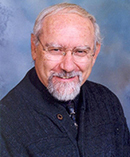
In the Congregation of Holy Cross, devotion to Mary Our Lady of Sorrows holds a major place. Our founder, Blessed Basile Moreau, expressed it to us in the book of our Constitutions and Statutes: "In the first place, we solemnly commemorate Our Lady of Sorrows throughout the Congregation, because of all of us she is the particular patroness."
If Fr. Moreau first presents to us Mary at the foot of the cross of Jesus, it is because her presence there puts her in the first place. Then he can say in a sermon, "O Blessed Mother, who can ever understand the extent and intensity of your compassion?" Yes, it is while Jesus is in agony on the cross and Mary and John, his beloved disciple, are at his feet, that Mary is entrusted to us as Mother.
If Mary is given to us as a Mother in these extreme circumstances, it is because we have a very great need for her and without her, we cannot truly grow as a child of God.
In the history of the Church, Mary has always exerted a wonderful attraction on thousands of people, whether in Lourdes, Fatima, or elsewhere. She will always continue to attract thousands of faithful who are in need of healing, reconciliation, mercy, and love. Even today, for thousands of Christians, no other woman in the world is as celebrated as the Virgin Mary.
An innumerable number of cathedrals, churches, shrines, chapels, and monuments are dedicated to her; a multitude of statues, medals, holy images, and rosaries promote devotion to her.
Read more about the Patrons of Holy Cross
She has inspired the greatest artists for centuries. How can we understand and explain this recourse to Mary? It is because we are all born into a humanity where the forces of evil are at work in us and around us; and we cannot free ourselves from them, even by many efforts.
Moreover, we are all born powerless to point to God and do good. Mary is the only exception to this general situation. From the moment of her birth, Mary is in holiness and in original grace, and this comes to her from the salvation wrought in Jesus Christ.
Mary is the first Christian, she is the first saint. She is immaculate, without a trace of evil, filled with the light of God. This condition makes her a dwelling place worthy of the Son of God who gave her to us as Mother of the Church.
In the person of the disciple John who stands at the foot of the cross with the Virgin Mary, Jesus says to John, pointing to Mary: "Behold your Mother" and he says to Mary, pointing to John: "Behold your son."
So tradition says that from that day on, the disciple John took Mary into his home for his Mother. Like the beloved disciple John, we must take Mary into our home so that she may become our mother and teach us to grow up as children of God.
Moreover, Mary seems very discreet in the Gospels; she did not do any extraordinary things during Jesus' public life. Except in one circumstance, during the wedding at Cana where she was present with Jesus and the apostles. As the wine ran out during the wedding feast, Mary intervened to say to the servants, pointing to Jesus: "Do whatever he tells you," and then Jesus changed the water into wine. This is the only circumstance where Mary spoke to lead us to Jesus.
Today, it is to each one of us that Mary addresses herself by pointing to Jesus: "Do whatever he tells you."
Mary desires to make us constantly aware of the words and wills of her Son, Jesus. She firmly invites us to listen to his teachings and put them into practice. This is the foundation of all Marian devotion: "Go to Jesus."
On this feast of Mary, Mother of Sorrows, let us celebrate Mary our Mother. May she watch over us as her children and lead us to her Son Jesus, our Saviour.

Fr. Pierre Dufour, C.S.C., a member of the Province Canadienne, wrote this reflection for the Feast of Our Lady of Sorrows, the patronal feast of the Holy Cross Family. Over his long religious life, Fr. Pierre has worked in both education and parish ministry both in France and his native Canada. He also has worked many years at Saint Joseph’s Oratory, both as Vice-Rector and on the pastoral team.